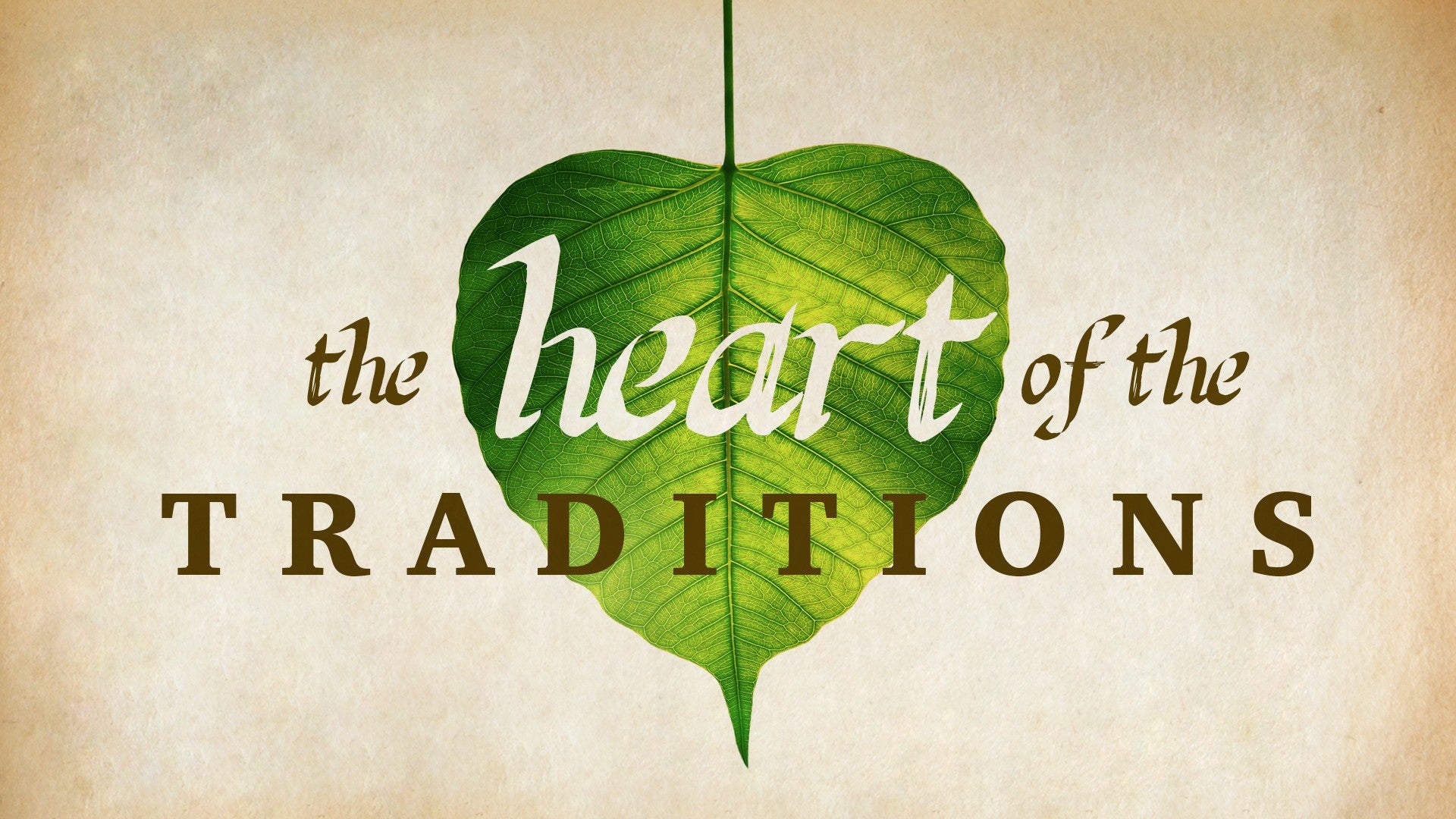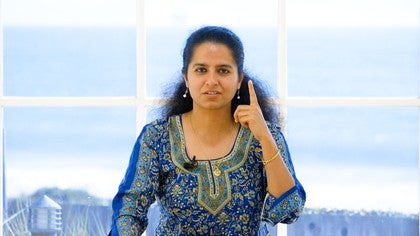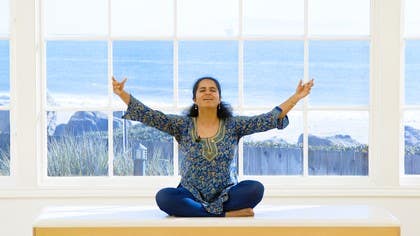Description
About This Video
Transcript
Read Full Transcript
In our previous discussions on surrender, one thing that emerged was that when one is called to surrender, there are two entities that are there. So the question is, who is this person who has to surrender? Who is surrendering? In Sanskrit, the question has been very powerfully asked. It is koham.
It's composed of two Sanskrit words, kaha, aham. Kaha means who and aham means I. Who am I? And when you put that together, it becomes koham. Say that, koham.
So who really is this being? Who is being invited to surrender? So if the question was asked to you and you had to give a spontaneous reply, who are you? What would you say? I am X with a particular name, so I am Anuradha.
So we associate ourselves with a name. Others might say I'm a woman, I'm a man, so gender is important. Others might say I'm a teacher, I'm a singer. So one's professional identity is an important one. Or there are some others who would probably say that I am a mother, I'm a father, I'm a loving husband or a loving wife.
So our relationships also form who we are. But the question which is more fundamental than that is are we really our relationships? So if the relationship changes, have we changed? If we say that we are a particular professional, when we change jobs, have we changed? If we say that I have a certain name, well if the name changes for whatever reason, does that imply that we have become a different person?
Hold this question because it becomes, this question is a little deeper than what we think it is. In today's world, there are people who also experience sex change. So then do we become somebody completely different? The essential who you are, to what extent is it related to who you've become? Sit with that thought just for a small moment, just pause on that.
Who am I versus who have I become? So just close your eyes and try and feel what these questions evoke in you. So who am I and who have I become or what have I become? And did you sense a movement, a movement from a position of being to something which has become something and that something is actually open to changes while who am I seems to have a more solid and more stable basis? Now the yogis push this question even further.
They ask themselves this question with respect to their body and they said, okay, am I this body? What do you think? Of course I am this body because if I have an itch, I do not scratch somebody else or if I am hungry, I don't go and feed somebody else. So of course I'm my body. What do you mean?
Right. So of course I am this body. But the question is, are you only this body or which body are you? Are you the body of the child or even before that, are you the body of the baby, the body of the child, the baby of the adolescent, the baby of the adult and the body of the older person? Which body is yours?
And my friends, the fact is that every seven years it seems that every single molecule of our body is changed. So if one had to connect our identity to our physical form alone, that reality would be completely non-existent in seven years time. So of course we have an association, we have an identity with this form, but our sense of it is also that I am not only this body. Because while the body has changed through time, the I that has remained the Anuradha behind all these bodies has continued and is the same in the sense of the experience of being. Then let's take this question to the next level.
So I am this body, but I am not only this body, all right? Let's take it further. Am I my emotions? Because we are also made of emotions and these emotions are slightly different from our thoughts. How do we know that?
Well, if I am angry at something and my mind is very clearly telling me don't get angry because it's not the right thing to do, the anger can still get me and I can become mad. So while the mind has its own position, there seems to be an independence at the level of our emotions to act in a way that is more compulsive, right? So while they are not compartmentalized in completely different things, there is a certain degree of independence of these two levels. So if I have to answer this question or if I have to ask you the questions, are you your emotions? Just take a few minutes and try and see to what extent you relate to your emotions.
So what do you think? Are you your emotions? If you say yes, then the question is which emotion? Are you the you when you are happy? Are you the you when you are sad or the you when you are angry or the you when you are in bliss?
Which you? If you said no, you are probably closer to the way the yogis understood it because they said that while we have all these different emotions that can pass through us and that we can identify with, we are not really those emotions. So the beauty of recognizing that is that suddenly one can have this distance. If I am not my emotion, then I have a choice about the emotion I want to embody. I need not surrender myself to an emotion.
Do you get that? I can accept to have an emotion, but I can accept not to have an emotion. So in this context, when we are talking of surrender, it is really not about the letting go or getting carried away with a certain emotion. In this context, surrender means a conscious decision of giving. So acceptance could be a closer notion of surrender in the yogic context, fine.
So we were looking at what would happen if we recognized that I am not my emotion. So this distance of I am not my emotion can empower the individual not to get carried away. So there is a possibility of a choice of choosing what can manifest itself through us or letting go that which we don't think is helpful for us. So who is this helpful for? Again the question of who am I?
Why would the I make one decision over the other? What are the benefits of choosing one emotion over the other and what for? Do you see that in every step that we make backwards or inwards, it seems to unfold a larger plot outwards. We are not just like a boat on the ocean that is getting tossed around and that has no will to steer its own course. So recognizing that I am not only my emotions can be a very liberating experience for an individual, for each one of us for that matter.
So we were at the step where I am not my body, I am not only my body, I am not only my emotions. Of course I have emotions and I can allow myself to be carried away with it, identify with them, but I am not only my emotions. Then the next question is, Koham, who am I then? You got it. We are our thoughts, right?
Because that plays such an important role in determining who I am, what I want to associate with, etc, etc, etc. But do you really think that you are your thoughts? Was a moment? And think about it. So are you your thoughts?
The question is which thought? If you said yes, which of your thoughts was you? And are you that flippant in a sense that you would keep changing from one thought to another and another and another? Fortunately not. So this box here allows thoughts to pass through it, it can generate certain thoughts maybe, but then it is only a receiver of thoughts that can come, go, that can be allowed to be processed within it, but the I is not the thought.
Then recognizing that can be quite a source of liberation because normally what happens is if somebody disagrees with what I am saying or what I am thinking, I don't like the person because the equation in my head is that person doesn't like my thinking equals that person doesn't like me. That mistake only happens if the equation is I am my thoughts, but the moment one understands that I am not only my thoughts, I have thoughts, I can have thoughts, I can identify with my thoughts, but I am not the thoughts. And therefore, if somebody disagrees with what I think, that doesn't mean that that person doesn't like me. And the recommendation there is try to liberate yourself from your thought as well because this would give you the bandwidth to continue friendships, to continue relationships even if they disagree with what you are thinking or what you are saying, right? Now we are going into deep waters.
So I am not my body, I am not my emotions, I am not my thoughts, then who the hell am I? Koham. If you don't have an immediate answer, don't worry. Ramana Maharshi in India, one of the great seers of the last century would make that the only question that he would ask to all the disciples and people who came to meet him. Whatever the question was, he would go back to this fundamental question of who are you?
Because arriving at the solution or arriving at an understanding of who am I solves a lot of problems. The moment we are able to focus our attention on our being, it helps us liberate ourselves from everything that is not our being, right? So in the yoga tradition they tell us that the more one is able to step back from the different identities that we acquire over our lifetime, whether it is an identity to the physical part, whether it is an identity to our emotional being or to our mental being, that all these things that are constantly undergoing changes are not our essential nature. When we can step back from all of that, there is a certain position in everybody and that state of being is a state of knowingness. I think when Socrates said, know thyself, he really meant that it was possible to know thyself.
It wasn't a philosophical fictitious adventure that you were asked to embark upon. The question know thyself or rather the invitation know thyself was uttered because of the possibility of arriving at a truth of being which can be stable while everything around is in a flux. And the joy of that discovery lies in the fact that it is like a drop of water. It is the experience of the essence of that drop of water which when it touches its origin which is the ocean can become the expanse of the ocean. So let's contemplate this question of Koham through a small practice.
So close your eyes, sit comfortably. Just become conscious of your breath and ask yourself this question, Koham, do that, Koham, can you consciously enter into your body reality and then take a step back from that. See what it feels like. Next, connect yourself to your emotional being. Allow yourself to get tossed in its different emotions and then step back from that and watch it.
Then allow yourself to get into your mind, to get into your thoughts and then take a step back from that and watch it. Who is the observer, Koham? Stay with the question, who is the observer, Koham? Spend time on this. At the end of the day, it's the only question that's worth our existence, Koham.
The Heart of the Traditions
Comments
Becoming an observer specially when faced with a big decision, often gives one the vantage point of looking at the larger picture which is harder to see when one is involved neck-deep in a particular situation that needs the decisive action.
On another note, your English was more than sufficient to articulate your question clearly.. so don't worry too much about it. All the best. Happiness always :)
You need to be a subscriber to post a comment.
Please Log In or Create an Account to start your free trial.











